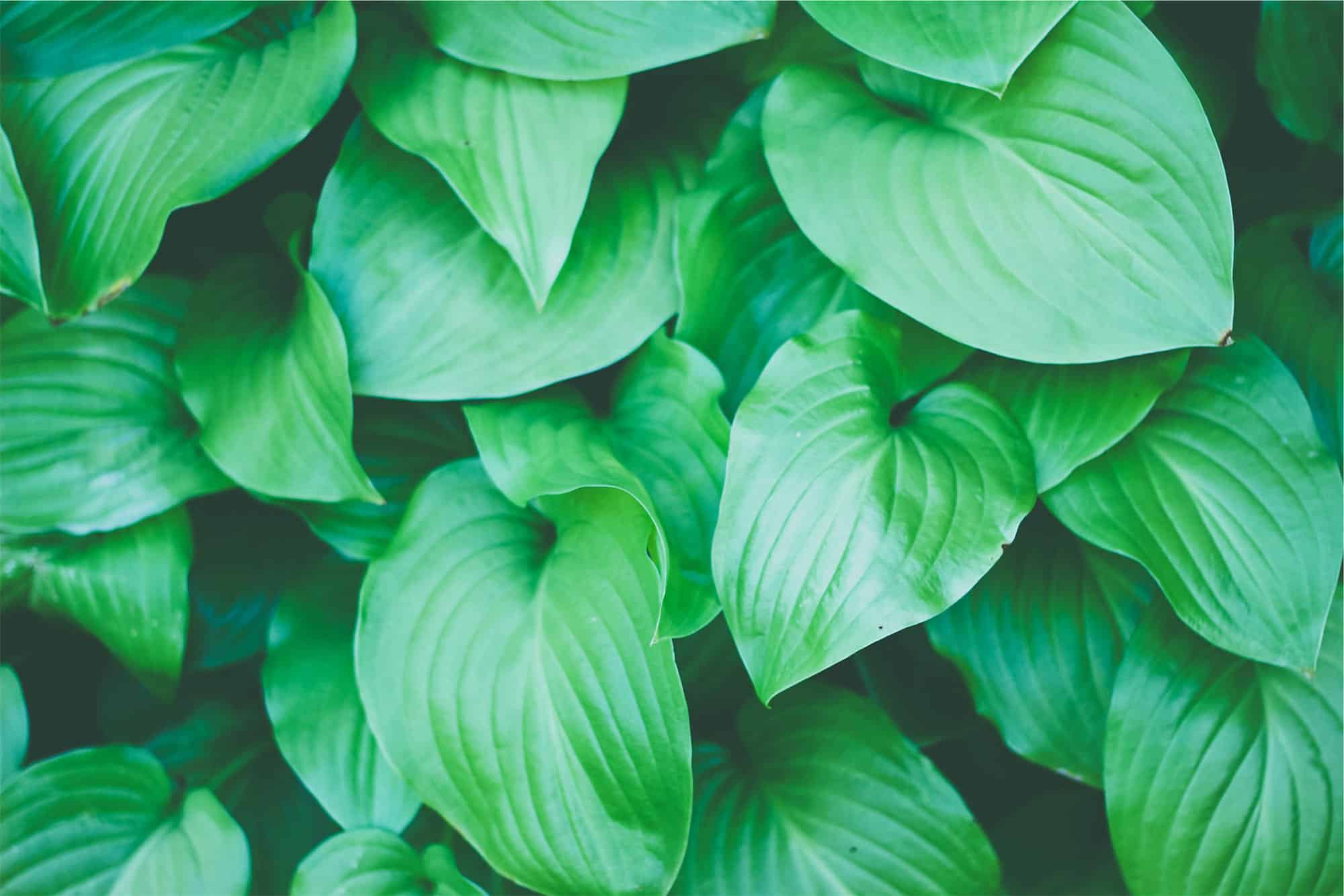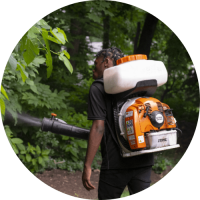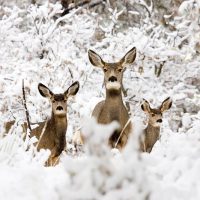Organic, Natural Deer Repellent
Effective, Natural Deer Repellent Solutions
Deer identify a plentiful landscape and tend to stay close until the food sources are depleted. Pure Solutions natural deer repellent service lets you enjoy the beauty of your backyard by providing integrated, natural solutions that deter deer from feeding on your property.

Our organic, all-natural deer repellent solutions do not harm deer and are biodegradable, so they protect the environment too.

Deer Damage Season
Damage to landscape plantings and ornamentals may occur year-round but is usually most severe in the winter and early spring when natural food sources are limited. Download our free list of deer-favored plants.
-
 "After twelve years of losing our hydrangeas, rhododendrons, and peonies despite several different 'deer solutions,' we learned Pure Solutions was branching out into deer repellent services this summer and decided to give it a try. We were thrilled the other day when we watched a deer enter our yard, sniff our shrubs, and walk away without a single nibble!"
"After twelve years of losing our hydrangeas, rhododendrons, and peonies despite several different 'deer solutions,' we learned Pure Solutions was branching out into deer repellent services this summer and decided to give it a try. We were thrilled the other day when we watched a deer enter our yard, sniff our shrubs, and walk away without a single nibble!"
Interested in a Free Estimate?
Learn More About How Our Organic Deer Repellent Works

1. Free Property Analysis
Our team provides a free property analysis to determine existing deer damage and recommend a treatment plan.

2. Treatment
We begin routine treatments where we apply natural products to targeted plants to repel deer from browsing while also preventing future damage.

3. No More Deer!
After routine and consistent treatments, deer feeding habits are interrupted and they no longer will come on your property in search of food.
Frequently Asked Questions
How to repel deer?
Repelling deer with all-natural sprays is a safe and effective method to keep them out of your garden or yard. All-Natural sprays can be applied directly to plants or around the perimeter of the area you want to protect. These sprays work by emitting strong smells and unpleasant tastes, which deter deer from approaching. It is important to reapply the organic sprays regularly, especially after rain or watering, to ensure they remain effective. As deer are adaptable creatures, it is recommended to switch up the type of all-natural spray used periodically to maintain their effectiveness.
What smells repel deer?
Deer have a very strong sense of smell, and there are certain scents that they find repulsive. One common scent that repels deer is the smell of predator urine, such as coyote or fox urine. This is because deer associate the scent with danger and will often avoid areas where they can detect it. Similarly, the scent of other predators like bobcats or mountain lions can also be effective at repelling deer. Other smells that may repel deer include strong fragrances like perfumes or colognes, and the strong scent of soap. Some people also swear by the use of certain essential oils, such as peppermint or lavender, which can be effective at repelling deer. Ultimately, the effectiveness of these smells can vary depending on the individual deer and the specific situation, but it's worth experimenting with different scents to find what works best for you.
What smell do deer hate the most?
Deer can be a significant challenge for gardeners and farmers as they tend to graze on a wide variety of plants. However, there are several plants that repel deer due to their strong scents or unpleasant taste. Some examples of plants that deer tend to avoid include lavender, sage, yarrow, daffodils, and marigolds. These plants have distinctive fragrances that deer find unappealing, and they can also contain compounds that make them taste bitter or even toxic to the animals. By incorporating these plants into your garden or landscape, you can help protect your other plants from deer damage without resorting to harmful chemicals or fences.
What do deer absolutely hate?
Deer have a number of things that they generally dislike or avoid. One of the biggest things that deer hate is the scent of humans. They are naturally wary of humans and can be easily spooked by the presence of human scent. Additionally, deer are often repelled by strong, pungent odors, such as those produced by certain plants or by products that contain urine or other scents from predatory animals like coyotes and wolves. As prey animals, deer are always on the lookout for potential danger, so anything that signals a potential threat may cause them to avoid an area. By understanding what deer dislike, it is possible to take steps to minimize their impact on gardens, crops, and other areas where deer may be unwanted.
The best deterrent to keep deer off your property is an all-natural product to avoid environmental damage and to offer the safest solution to your family. We use OMRI listed, all-natural deer repellents to deter deer from entering your property, eating your plants and depositing ticks on your property.
The best deterrent to keep deer off your property is an all-natural product to avoid environmental damage and to offer the safest solution to your family. We use OMRI listed, all-natural deer repellents to deter deer from entering your property, eating your plants and depositing ticks on your property.
We perform deer treatments ever 21 days since the products we use are biodegradable and begin to deteriorate after 3 weeks from application.
Damage to landscape plantings and ornamentals may occur year-round, but is usually most severe in the winter and early spring when natural food sources are limited. Ticks are carried to your yard by deer and other wildlife. By deterring deer from your property, you also decrease the risk of contracting tick-borne illnesses near the home.
Deer are known for their agility and ability to navigate through various types of terrain, including rocky hillsides and dense forests. However, there are certain surfaces that deer tend to avoid walking on. One of the most notable examples is slippery or unstable surfaces, such as ice or wet rocks. These surfaces can be dangerous for deer, as they increase the risk of slipping and falling, which can result in injury or even death. Additionally, deer tend to avoid walking on sharp or thorny plants, as these can cause painful cuts and scratches on their sensitive hooves.
Deer repellent works by emitting a scent or taste that is unpleasant to deer, causing them to avoid the area where the repellent has been applied. The active ingredients in deer repellent can vary depending on the product, but they commonly include natural compounds such as putrescent eggs, garlic, or capsaicin (a chemical found in chili peppers). These compounds mimic the smell or taste of a predator, which signals to the deer that the area is not safe. Additionally, some deer repellents contain ingredients that create an uncomfortable sensation for deer, such as a burning or tingling feeling on the tongue.
